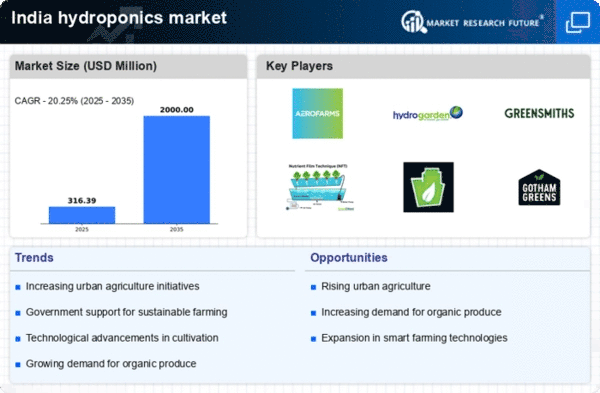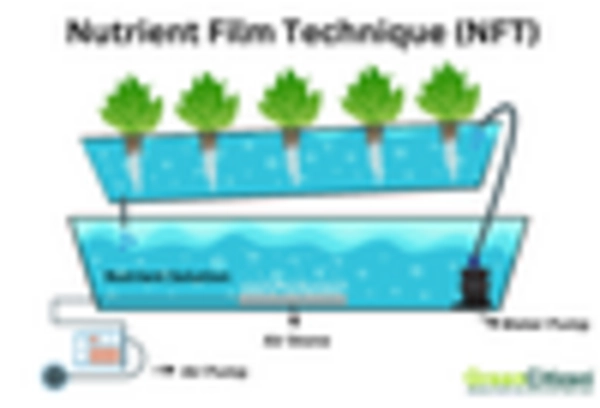Water Conservation Practices
Water scarcity is a pressing issue in India, making efficient water usage a critical concern. Hydroponics market presents a viable solution, utilizing up to 90% less water compared to traditional soil-based agriculture. This efficiency is particularly relevant in regions facing severe water shortages. The Indian government has recognized the importance of sustainable agricultural practices, promoting hydroponics as a method to conserve water while ensuring food security. As awareness of water conservation grows, more farmers and entrepreneurs are likely to adopt hydroponic systems. This shift not only addresses environmental concerns but also enhances the viability of agriculture in arid regions. The hydroponics market is thus poised for growth as it aligns with national priorities for sustainable water management and agricultural productivity.
Rising Demand for Fresh Produce
The hydroponics market in India is experiencing a notable surge in demand for fresh and organic produce. As urban populations grow, consumers increasingly seek locally sourced, pesticide-free fruits and vegetables. This trend is driven by heightened health consciousness and a preference for sustainable food sources. According to recent data, the demand for organic produce in India has increased by approximately 25% over the past few years. Hydroponics, with its ability to produce high-quality crops in controlled environments, aligns perfectly with this consumer shift. The hydroponics market is thus positioned to capitalize on this growing demand, offering fresh produce year-round, irrespective of seasonal constraints. This driver indicates a robust opportunity for market players to expand their offerings and cater to the evolving preferences of health-conscious consumers.
Urbanization and Space Constraints
Rapid urbanization in India is creating significant challenges for traditional agriculture, particularly in metropolitan areas where space is limited. The hydroponics market offers a solution by enabling food production in compact spaces, such as rooftops and balconies. This method allows urban dwellers to grow their own food, thereby reducing reliance on external supply chains. As urban populations continue to rise, the demand for space-efficient farming solutions is expected to increase. Hydroponics systems can be implemented in various urban settings, making them an attractive option for city residents. This driver suggests that the hydroponics market is well-positioned to thrive in urban environments, catering to the needs of a growing population while promoting local food production.
Technological Integration in Farming
The integration of advanced technologies in agriculture is transforming the hydroponics market in India. Innovations such as IoT, AI, and automated systems are enhancing the efficiency and productivity of hydroponic farms. These technologies enable real-time monitoring of plant health, nutrient levels, and environmental conditions, leading to optimized growth cycles. Reports suggest that the adoption of technology in agriculture could increase yields by up to 30%. As farmers seek to maximize output and minimize labor costs, the appeal of technologically advanced hydroponic systems is likely to grow. This trend indicates a shift towards precision farming, where data-driven decisions enhance crop quality and resource management. Consequently, the hydroponics market stands to benefit from this technological evolution, attracting investments and fostering innovation.
Investment in Sustainable Agriculture
There is a growing trend towards investment in sustainable agricultural practices in India, with hydroponics market emerging as a focal point. Investors are increasingly recognizing the potential of hydroponics to deliver high yields with minimal environmental impact. This shift is supported by government initiatives aimed at promoting sustainable farming methods. Recent data indicates that investments in sustainable agriculture have increased by over 40% in the last few years. As more stakeholders, including private investors and agricultural cooperatives, channel funds into hydroponics, the market is likely to expand. This influx of capital can facilitate research and development, leading to improved technologies and practices within the hydroponics market. The emphasis on sustainability aligns with global trends, positioning the hydroponics sector for future growth.
















